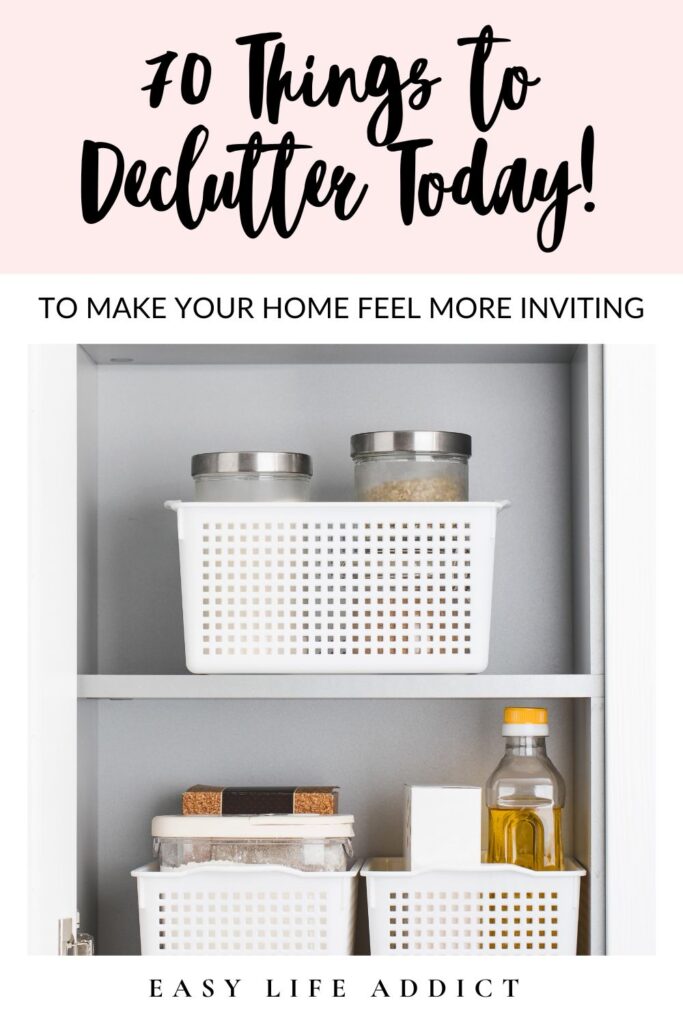70 Things to Declutter to Make Your Home Feel More Inviting!
Declutter your home and create a more inviting atmosphere with these 70 things to declutter. Say goodbye to excess and hello to a cosy space!
This post may contain affiliate links. That means if you click on a link and purchase something I recommend, I will receive a small commission at no extra cost. As an Amazon Associate, I earn from qualifying purchases. This helps keep my website up and running and is very appreciated. Thank you for your support! You can read my full disclosure policy here.
70 Things to Declutter to Make Your Home More Inviting!
In today’s fast-paced world, our homes often serve as sanctuaries from the chaos of everyday life. But when clutter takes over, that sanctuary can quickly become a source of stress.
Luckily, decluttering doesn’t have to be overwhelming. With a systematic approach and determination, you can transform your living space into a welcoming haven that rejuvenates your mind and spirit. In this guide, we’ll explore 70 things you can declutter to make your home more inviting and create a peaceful environment you’ll love coming back to.
Room by Room Decluttering
If the thought of decluttering the whole house feels a little overwhelming, simplify the process by doing it room by room. Focusing on one room at a time allows you to concentrate your efforts, making the task more attainable and less daunting. This approach allows for better organisation and prioritisation of items within each space, as individuals can individually assess each room’s specific needs and functions.
Additionally, decluttering room by room encourages a sense of accomplishment as progress is made in each area, motivating the entire house to continue the process. Overall, this systematic approach helps to streamline the decluttering process, making it easier to maintain focus, stay organised, and ultimately achieve a clutter-free home.
Kitchen

- Expired Food Items: Check your pantry, refrigerator, and freezer for expired or spoiled food items. Dispose of anything past its prime to make room for fresh ingredients.
- Duplicate Kitchen Tools: Do you have multiple spatulas, spoons, or measuring cups? Keep what you regularly use and donate or discard duplicates to free up drawer space.
- Mismatched Tupperware and Lids: Sort through your plastic containers and lids. Discard any containers with missing lids or vice versa. Consider investing in a set of matching containers for better organisation.
- Unused Appliances: If you have kitchen gadgets or appliances gathering dust because you never use them, let them go. Donate or sell appliances that no longer serve a purpose in your kitchen.
- Expired Spices and Condiments: Spices lose their potency over time, and condiments can expire. Check the expiration dates on your spices and sauces and discard anything past its prime.
- Broken or Chipped Dishware: Assess your plates, bowls, and glasses for chips or cracks. Broken dishware not only takes up space but can also be hazardous. Replace or recycle damaged items.
- Old Cookbooks and Recipe Clippings: Are you holding onto cookbooks you never use or recipes you’ve never tried? Declutter your collection by donating or passing on books you no longer need.
- Unused or Outdated Kitchen Linens: Go through your kitchen towels, oven mitts, and tablecloths. Discard any items that are stained, torn, or worn out. Keep only the linens you regularly use.
- Excess Plastic Bags and Packaging: Accumulated plastic bags and packaging can quickly clutter your kitchen drawers and countertops. Consider recycling or repurposing excess bags and packaging materials.
- Expired or Unused Kitchen Cleaning Products: Check the expiration dates on your cleaning products and dispose of any past their prime. Keep only the essential cleaning supplies you regularly use.
Decluttering your kitchen can create a more organised and functional space, making meal preparation and cooking more enjoyable. Take the time to assess your kitchen items regularly and let go of anything that no longer serves a purpose.
Living area
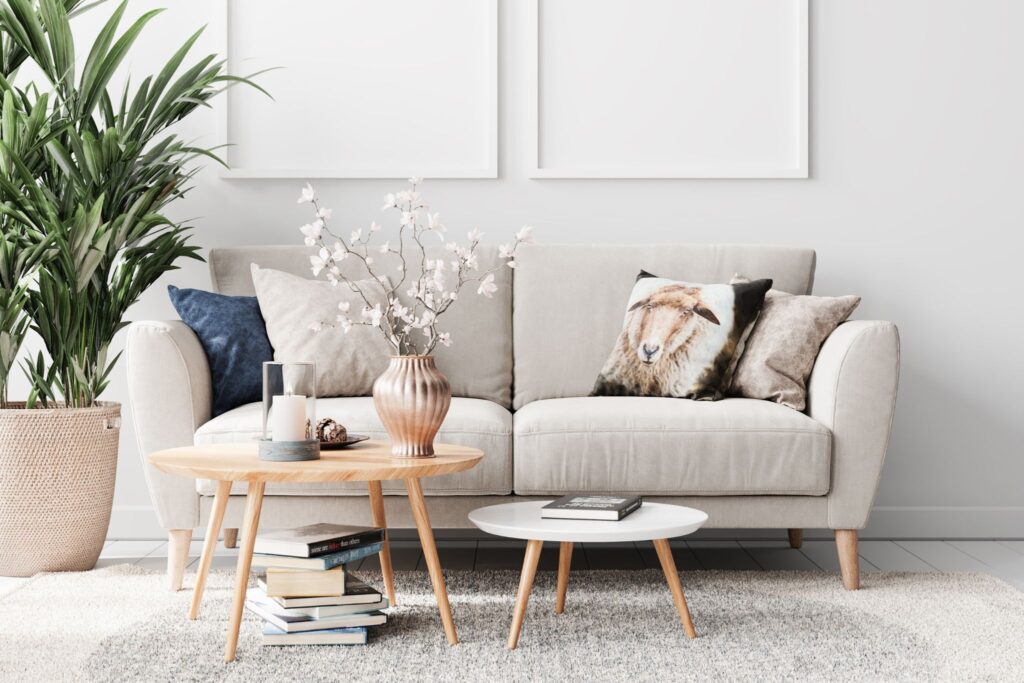
- Old Magazines and Newspapers: A stack of old magazines and newspapers can accumulate quickly, taking up valuable space and creating visual clutter. Recycle or donate them to clear up your living area.
- Excessive Decorative Items: While decorative items can add personality to your living space, too many can overwhelm the room. Consider paring down your collection and keeping only the pieces you truly love that contribute to the overall aesthetic.
- Unused or Broken Electronics: Broken or outdated electronics, such as old televisions, DVD players, or game consoles, can take up space in your living area. Dispose of them responsibly, or consider donating them if they’re still in working condition.
- Excess Throw Pillows and Blankets: While throw pillows and blankets can add comfort and style to your living room, too many can make seating areas feel cluttered. Keep only the ones you regularly use and love, and donate or store the rest.
- Unnecessary Furniture: Evaluate the furniture in your living area and consider whether each piece serves a purpose or takes up space. If you have furniture that you rarely use or that doesn’t fit the room’s layout, consider selling or donating it.
- Toys and Games: If you have children, toys and games can quickly take over your living area. Set aside time to declutter their toys and games regularly, donating or passing on items they’ve outgrown or no longer play with.
- Unused or Outdated Decor: Decor items like artwork, sculptures, or vases that no longer fit your style or taste can create unnecessary clutter. Consider rotating decor items seasonally or donating pieces that no longer resonate with you.
- Excessive Cables and Cords: Tangled cables and cords can make your living area look messy and disorganised. Invest in cable organisers or cord concealers to keep them neat and tidy, and dispose of any cables you no longer need.
- Old or Unused Media: DVDs, CDs, and video games you no longer watch or play can occupy valuable shelf space. Declutter your media collection by donating or selling items you no longer enjoy.
- Expired or Unused Plants: If you have live plants in your living area, check to see if any of them are dead or dying. Dispose of dead plants and consider repotting or relocating plants struggling to thrive.
By decluttering these items from your living area, you can create a more spacious, organised, and inviting space to relax and enjoy spending time with family and friends.
Bedroom

- Clothing You No Longer Wear: Go through your wardrobe and identify clothing items you no longer wear or fit. Donate or sell these items to free up closet and dresser space.
- Mismatched Socks and Underwear: Sort through your sock and underwear drawers and discard any items that are worn out, torn, or missing mates. Keep only the items that are in good condition and that you actually wear.
- Excess Bedding and Linens: Assess your collection of sheets, blankets, and pillowcases and declutter any items that are stained, torn, or worn out. Keep only the bedding and linens that you regularly use and love.
- Unread Books and Magazines: If you have a stack of unread books or magazines on your nightstand or bookshelf, consider decluttering them. Donate or pass on items that you no longer plan to read.
- Unused or Broken Furniture: Evaluate the furniture in your bedroom and consider whether each piece serves a purpose or just takes up space. Donate or sell furniture you no longer use, or that doesn’t fit the room’s layout.
- Excessive Decorative Items: While decorative items can add personality to your bedroom, too many can make the space feel cluttered. Consider paring down your collection and keeping only the pieces contributing to a calm and restful atmosphere.
- Expired or Unused Personal Care Products: Check the expiration dates on your skincare products, makeup, and other personal care items. Discard anything that is expired or that you no longer use.
- Unused Exercise Equipment: If you have exercise equipment in your bedroom that you rarely use, consider decluttering it. Donate or sell items that are taking up space and that you no longer use.
- Old Electronics: Broken or outdated electronics, such as old alarm clocks, chargers, or speakers, can create unnecessary clutter in your bedroom. Dispose of them responsibly or consider recycling them.
- Unnecessary Paperwork: Sort through any paperwork or documents accumulated in your bedroom and discard anything no longer needed. File important documents or shred documents that contain sensitive information.
By decluttering these items from your bedroom, you can create a more peaceful and relaxing environment that promotes restful sleep and rejuvenation.
Bathroom
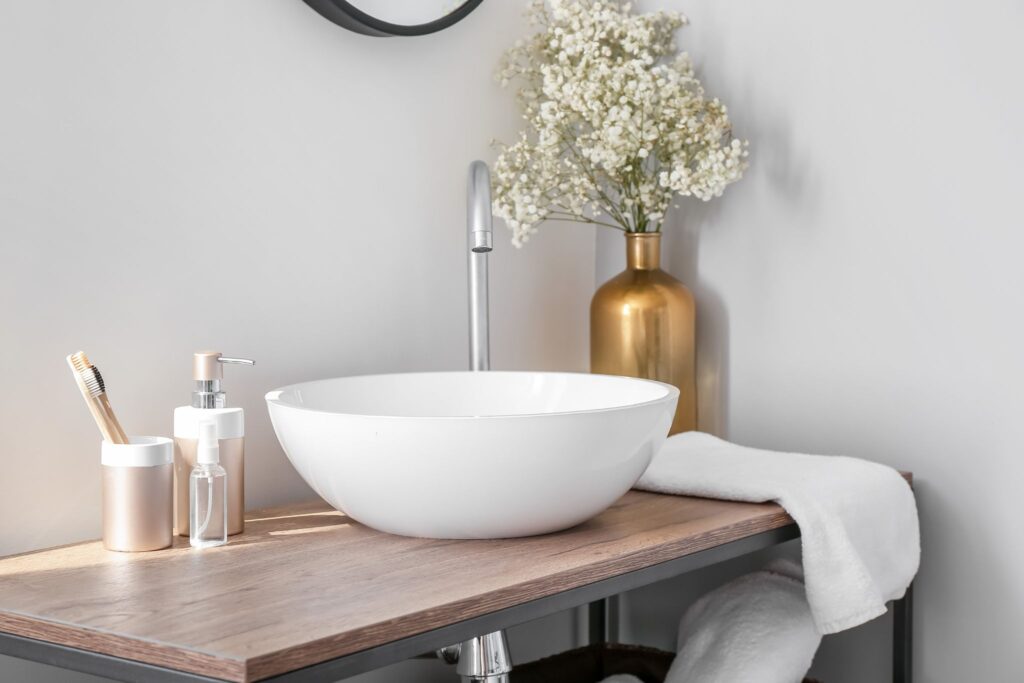
- Expired Medications and Toiletries: Check the expiration dates on your medications, skincare products, and toiletries. Discard anything that is expired or that you no longer use.
- Unused or Expired Makeup: Go through your makeup collection and declutter any products that are expired or that you no longer use. Keep only the items that you regularly use and love.
- Old Towels and Washcloths: Assess your collection of towels and washcloths and declutter any items that are worn out, stained, or torn. Keep only the ones that are in good condition and that you regularly use.
- Unused or Expired Hair Products: Sort through your haircare products and declutter any expired or no longer used items. Keep only the products you regularly use that work well for your hair.
- Empty or Near-Empty Bottles: Check your shampoo, conditioner, and body wash bottles for empty or nearly empty ones. Consolidate or refill bottles to free up your shower or bathroom counter space.
- Unused or Expired Skincare Samples: If you have accumulated samples of skincare products you never use, consider decluttering them. Keep only the samples you intend to use and donate or pass on the rest.
- Broken or Unused Hair Tools: Evaluate your collection of hair tools, such as hair dryers, straighteners, and curling irons. Dispose of any broken or no longer used tools.
- Expired Cleaning Products: Check the expiration dates on your bathroom cleaning products and discard any expired ones that you no longer use. Keep only the essential cleaning products that you regularly use.
- Unused or Expired Dental Products: Go through your collection of dental products, such as toothpaste, mouthwash, and dental floss. Discard anything that is expired or that you no longer use.
- Excess Bath Toys or Accessories: If you have children, assess their bath toys and accessories and declutter any items that are broken, worn out, or that they no longer play with. Keep only the items in good condition and that they enjoy using.
By decluttering these items from your bathroom, you can create a more organised and functional space that promotes relaxation and self-care.
Hallways

- Shoes and Footwear: Shoes left strewn across the hallway or stairs can create a tripping hazard and make the area feel cluttered. Keep only the shoes you wear regularly near the entrance and store the rest in a designated area like a closet or shoe rack.
- Coats and Jackets: If your hallway is cluttered with coats and jackets, consider decluttering them. Donate or store coats that are out of season or that you no longer wear regularly to free up space.
- Unopened Mail and Packages: Mail and packages left on the hallway table or stairs can quickly accumulate and create visual clutter. Sort through your mail regularly and recycle or file away any unopened mail to keep the area tidy.
- Toys and Belongings: If you have children, toys and belongings scattered in the hallway or stairs can create a tripping hazard and make the area feel cluttered. Encourage your children to tidy up after themselves and designate a specific area for their belongings.
- Excess Decorative Items: While decorative items can add personality to your hallway, too many can overwhelm the space. Consider paring down your collection and keeping only the pieces you truly love that contribute to the overall aesthetic.
- Unused Furniture: Evaluate any furniture in your hallway and consider whether it serves a purpose or takes up space. If you have furniture that you rarely use or that doesn’t fit the space, consider selling or donating it to free up room.
- Sports Equipment: Sports equipment left in the hallway or on the stairs can create clutter and make it difficult to navigate the space. Store sports equipment like balls, rackets, and helmets in a designated area like a garage or mudroom.
- Household Items Waiting to be Put Away: Items left on the stairs or hallway that belong elsewhere in the house can contribute to clutter. Take a few minutes each day to put away out-of-place items to keep the area tidy.
- Excess Storage Boxes or Containers: If you use your hallway for storage, assess any boxes or containers and declutter items you no longer need or use. Consider investing in storage solutions that maximise space and keep items organised.
- Broken or Unused Electronics: Broken or outdated electronics left in the hallway or on the stairs can create unnecessary clutter. Dispose of them responsibly or consider recycling them to free up space.
By decluttering these items from your hallway and stairs, you can create a more spacious and welcoming entrance to your home.
Home Office
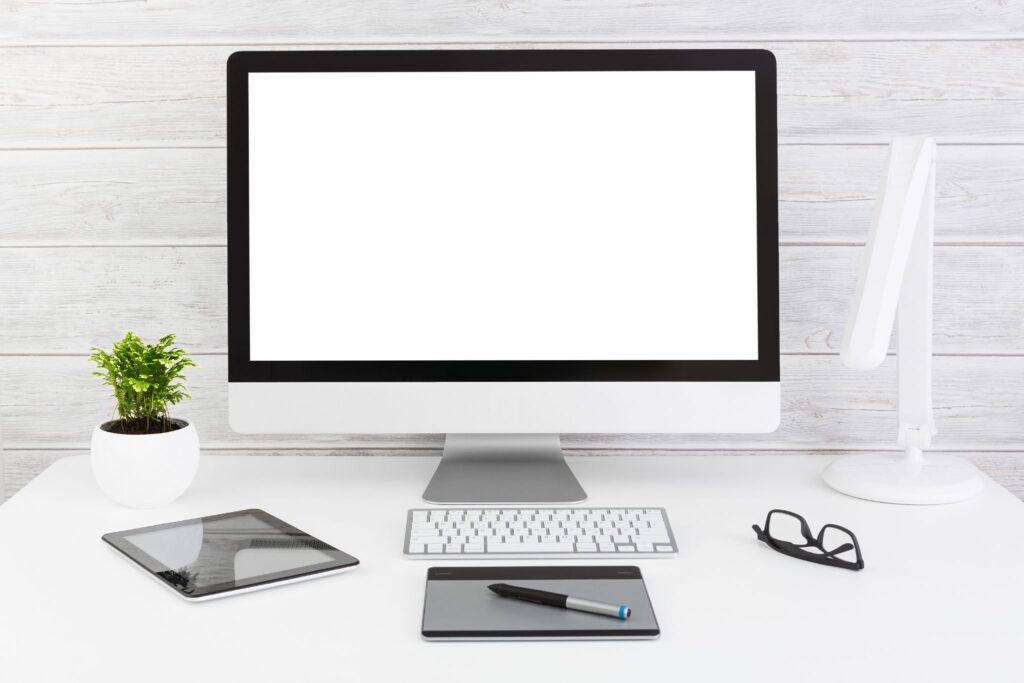
- Unused or Outdated Electronics: Old computers, printers, cables, and other electronic devices that are no longer in use can take up valuable space in your home office. If they’re still in working condition, consider recycling or donating them.
- Obsolete Paperwork: Sort through stacks of old documents, receipts, and paperwork and shred or recycle anything that is no longer needed. Create a filing system for important documents and keep it organised to prevent future clutter.
- Unused Office Supplies: Pens, pencils, sticky notes, and other office supplies can accumulate quickly, leading to clutter. Declutter your desk drawers and cabinets by donating or disposing of supplies you no longer use.
- Broken or Uncomfortable Furniture: Evaluate your home office desk, chair, and other furniture. If any items are broken, uncomfortable, or no longer serve their purpose, consider replacing or repairing them to create a more functional workspace.
- Outdated Technology Manuals: Manuals for electronics or software you no longer own or use can clutter your desk or shelves. Recycle or dispose of these manuals to free up space in your home office.
- Unused or Duplicated Stationery: Notebooks, notepads, and other items you never use can clutter your workspace. Donate or repurpose these items to clear up space in your home office.
- Excess Cables and Wires: Tangled cables and wires can create visual clutter and make it difficult to work efficiently. Invest in cable organisers or cord concealers to keep them neat and tidy, and dispose of any cables you no longer need.
- Unused or Outdated Decor: Decor items like artwork, sculptures, or plants that no longer fit your style or taste can create unnecessary clutter. Consider donating or repurposing these items to create a more inspiring workspace.
- Old Magazines and Books: Stacks of old magazines or books you no longer read can take up valuable space in your home office. Donate or recycle them to clear up space on your shelves or desk.
- Unused or Broken Office Equipment: Office equipment like paper shredders, staplers, or hole punchers that are broken or no longer used can clutter your workspace. Dispose of them responsibly or consider repairing them if they’re still functional.
By decluttering these items from your home office, you can create a more organised and productive workspace that inspires creativity and focus.
Garage
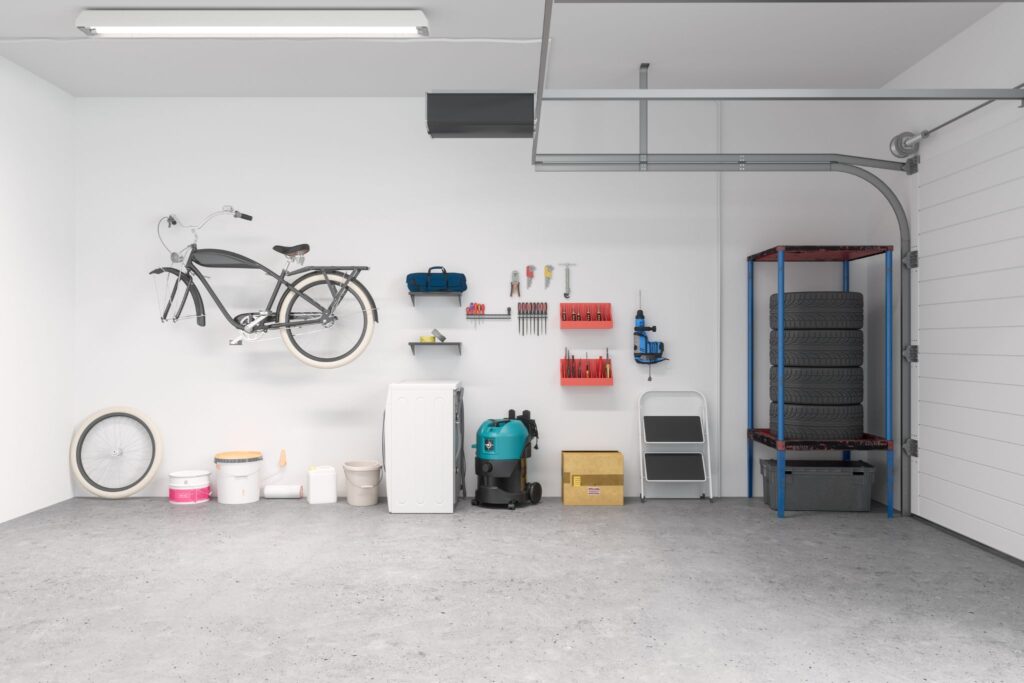
- Broken or Unused Tools: Evaluate your collection of tools and equipment and declutter any items that are broken, outdated, or that you no longer use. Consider donating or selling tools that are still in good condition but no longer serve a purpose for you.
- Old or Unused Sporting Equipment: Sporting equipment like bicycles, golf clubs, or camping gear that you no longer use can clutter your garage. Declutter these items by donating or selling them to free up space.
- Expired Chemicals and Cleaning Products: Check the expiration dates on any chemicals or cleaning products stored in your garage, such as paint, pesticides, or car fluids. Dispose of anything that is expired or that you no longer need.
- Unused or Broken Outdoor Furniture: Outdoor furniture that is broken or no longer in use can take up valuable space in your garage. Evaluate each piece and consider repairing, donating, or selling items still in good condition.
- Excess Building Materials: Leftover building materials like lumber, bricks, or tiles from past projects can clutter your garage. Assess what you need for future projects and dispose of or donate any excess materials.
- Unnecessary Packaging Materials: Boxes, bubble wrap, and packing peanuts leftover from deliveries or moves can accumulate in your garage and create clutter. Recycle or repurpose these materials to free up space.
- Outgrown or Unused Children’s Toys: Children’s toys and outdoor play equipment your children have outgrown or no longer use can clutter your garage. Donate or sell these items to clear up space for more functional storage.
- Obsolete Electronics and Appliances: Old electronics and appliances, such as TVs, stereos, or kitchen gadgets, that are no longer in use can clutter your garage. Dispose of them responsibly or consider recycling them to free up space.
- Unused or Broken Gardening Tools: Broken or no longer in use gardening tools and equipment can clutter your garage. Declutter these items by repairing, donating, or selling them to someone who will use them.
- Excess Holiday Decorations: Holiday decorations that you no longer use or that are broken can clutter your garage. Sort through your decorations and donate or dispose of any items that you no longer need or want.
By decluttering these items from your garage, you can create a more organised and functional space for storing your belongings and working on projects.
Final Thoughts
Decluttering your home can be a transformative experience, creating a more inviting and peaceful environment for you and your family. By assessing and purging unnecessary items, you can reclaim valuable space and create a sanctuary that nurtures your well-being. So why wait? Start decluttering today and reap the rewards of a more inviting home!
Remember to check out our related resources for decluttering tips, expert advice, and step-by-step guides to help you journey to a clutter-free home. Whether you’re tackling your closets, kitchen, or living spaces, we’ve got you covered with valuable insights and practical strategies to make the decluttering process a breeze.
Thanks so much for stopping by; I appreciate everyone who takes the time to read and make it to the end! I have lots of exciting new content in the next few weeks, so make sure you pop back to catch up!
